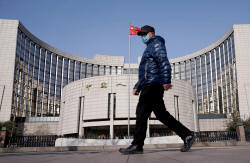China frees up $188 billion for banks in second reserve ratio cut this
year
 Send a link to a friend
Send a link to a friend
 [December 06, 2021] By
Stella Qiu and Kevin Yao [December 06, 2021] By
Stella Qiu and Kevin Yao
BEIJING (Reuters) -China's central bank
said on Monday it would cut the amount of cash that banks must hold in
reserve, its second such move this year, releasing 1.2 trillion yuan
($188 billion) in long-term liquidity to bolster slowing economic
growth.
The People's Bank of China (PBOC) said on its website it would cut the
reserve requirement ratio (RRR) for banks by 50 basis points (bps),
effective from Dec. 15.
The world's second-largest economy, which staged an impressive rebound
from last year's pandemic slump, has lost momentum in recent months as
it grapples with a slowing manufacturing sector, debt problems in the
property market and persistent COVID-19 outbreaks.
Some analysts believe growth could slow further in the fourth quarter
from the third quarter's 4.9%, although the full-year growth could still
be around 8%.
"The RRR reduction will help alleviate the downward pressure on the
economy and smooth the economic growth curve," said Wen Bin, a senior
economist at Minsheng Bank.
"Although there is little pressure to achieve this year's economic
growth target, economic work will face big pressures and challenges next
year."

The government has set a relatively modest annual economic growth
target, at above 6%, for this year, coming off the pandemic-stricken
2020.
The cut, the second this year following a similar broad-based reduction
in July, was flagged by Premier Li Keqiang on Friday as a way to step up
support for the economy, especially small firms.
The cut will not apply to financial institutions with existing RRR of
5%, it said, adding that the weighted average RRR for financial
institutions will be at 8.4% after the new reduction.
The RRR for large banks, after taking into consideration the
preferential policy of targeted cuts for inclusive financing, is
currently at 10.5%.
Some of the funds released will be used to repay matured medium-term
lending facility loans, according to PBOC, reaffirming a stance of not
resorting to "flood-like" stimulus.
The central bank will guide financial institutions to actively use the
released funds to step up support for the real economy, especially small
firms, it said.
The RRR cut will reduce the funding cost of financial institutions by
about 15 billion yuan per year, which will help lower financing costs of
firms, it added.
[to top of second column] |

A man wearing a mask walks past the headquarters of the People's
Bank of China, the central bank, in Beijing, China, February 3,
2020. REUTERS/Jason Lee/File Photo/File Photo

PROPERTY POLICY IN SPOTLIGHT
Advisers to China's government will recommend authorities set a 2022 economic
growth target below the one for 2021, giving policymakers more room to push
structural reforms..
President Xi Jinping said the economic situation at home and abroad remains
complex, adding that China will maintain overall social stability for the 20th
Party Congress next year, the official Xinhua news agency said.
China will deepen reforms and opening up, and promote higher quality
development, Xi said.
China's Politburo, a top decision-making body of the ruling Communist Party,
said on Monday that it would keep economic operations within reasonable range in
2022, and will promote the healthy development of the property sector, Xinhua
said.
"The key question on investors’ mind is whether the government is willing to
change the policy stance in the property sector, how much will be changed, and
whether a change of stance can really help to turn the sector around," said
Zhiwei Zhang, Chief Economist at Pinpoint Asset Management.
China's move to wean property developers away from rampant borrowing has
translated into loan losses for banks and pain in credit markets. It has also
worsened a liquidity crisis at developer China Evergrande and other real-estate
firms.
The authorities said on Friday they would step in and oversee risk management at
the company.
Authorities have recently made financing tweaks to help home buyers and widened
fund-raising channels for some developers.
The new Omicron coronavirus variant has also added uncertainty, as Beijing's
zero-COVID approach to stamp out local cases hit many small businesses.
($1 = 6.3749 Chinese yuan renminbi)
(Reporting by Beijing newsroom; Editing by Sam Holmes, Ed Osmond, Carmel
Crimmins and Louise Heavens)
[© 2021 Thomson Reuters. All rights
reserved.] Copyright 2021 Reuters. All rights reserved. This material may not be published,
broadcast, rewritten or redistributed.
Thompson Reuters is solely responsible for this content.
 |